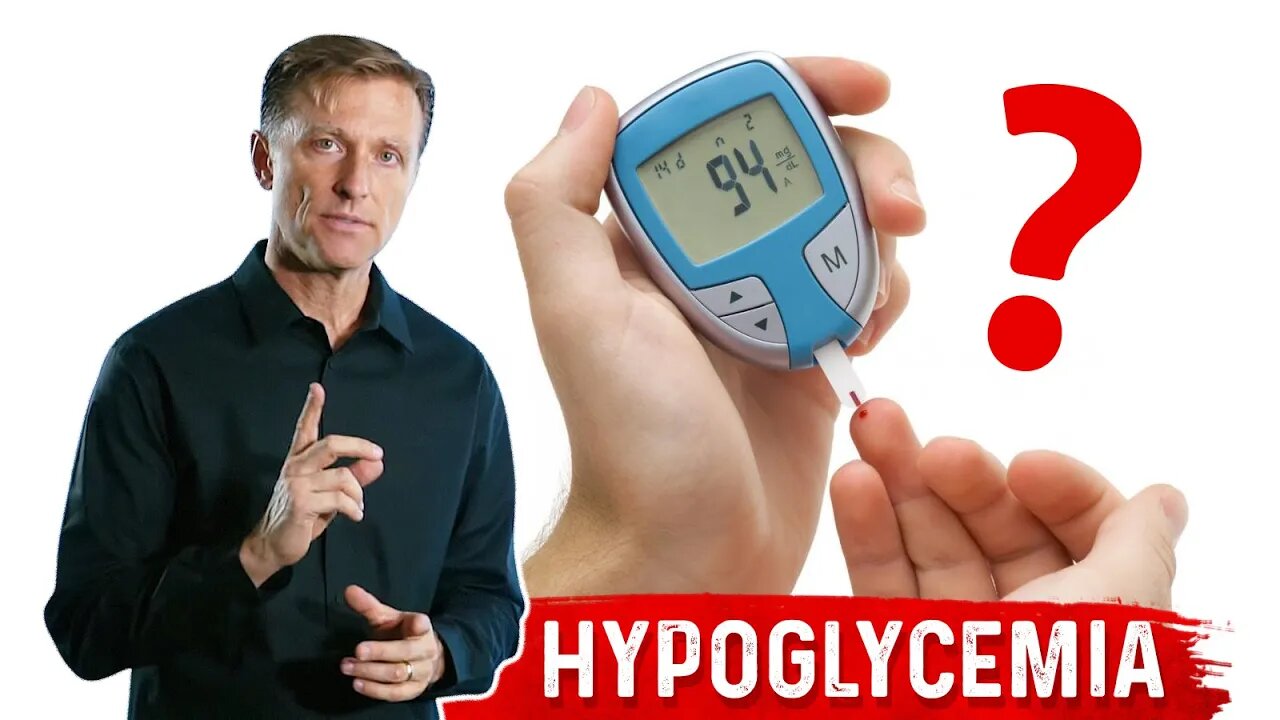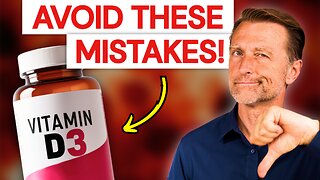Premium Only Content

Why Protein Helps Hypoglycemia (Low Blood Sugar)? – Dr.Berg
Here's what consuming protein may do if you have hypoglycemia. Check this out.
Healthy Ketogenic Diet and Intermittent Fasting:
https://youtu.be/vMZfyEy_jpI
https://youtu.be/mBqpaAKtnXE
https://youtu.be/3dHcT1-K-tw
Timestamps
0:21 Low blood sugar
0:44 Hypoglycemia symptoms
0:54 My experience with hypoglycemia
1:05 Protein as fuel for the body
1:59 Hypoglycemia and carbs
2:12 Will consuming protein raise insulin?
3:04 What you can do for hypoglycemia
In this video, we're going to talk about protein and hypoglycemia, and I'm going to cover how protein affects blood sugar.
With hypoglycemia, what happens, is when the blood sugar goes up, insulin pushes it down, leaving you with low blood sugar. People with low blood sugar typically have a higher amount of insulin pushing blood sugar down, and there are no counter hormones to push the blood sugar back up.
Hypoglycemia symptoms:
• Fatigue
• Dizziness
• Irritableness
• Grouchiness
• Dry eyes
• Depression
Some people have this idea that the fuel that the body uses is either glucose, fat, or ketones. But, protein can be used as fuel too. Protein can be converted into glucose through a process called gluconeogenesis. Protein can act as a fuel in addition to replacing the protein in your body. This is why when you consume protein when you have low blood sugar, you start feeling better.
If you have hypoglycemia and you were to consume carbohydrates, you might feel better for a minute, but then the insulin will kick the blood sugar back down. When you consume protein, you will stimulate some insulin, but at the same time, you will stimulate glucagon. Glucagon is the opposing hormone to insulin. Glucagon will raise the blood sugar, and insulin will lower it, creating a leveling effect.
I actually recommend a moderate amount of protein. I believe what may be best for those with hypoglycemia is to get on the healthy ketogenic diet combined with intermittent fasting.
Talk to a Product Advisor to find the best product for you!
Call 1-540-299-1556 with your questions about Dr. Berg's products. Product Advisors are available Monday through Friday 8am-6pm and Saturday 9am-5pm EST.
* At this time, we no longer offer Keto Consulting and our Product Advisors will only be advising on which product is best for you and advise on how to take them.
Dr. Eric Berg DC Bio:
Dr. Berg, 56 years of age is a chiropractor who specializes in Healthy Ketosis & Intermittent Fasting. He is the author of The New Body Type Guide and other books published by KB Publishing. He has taught students nutrition as an adjunct professor at Howard University. He no longer practices, but focuses on health education through social media.
Follow us on FACEBOOK: fb.me/DrEricBerg
Send a Message to his team: m.me/DrEricBerg
ABOUT DR. BERG: https://bit.ly/2xmxAei
Disclaimer:
Dr. Eric Berg received his Doctor of Chiropractic degree from Palmer College of Chiropractic in 1988. His use of “doctor” or “Dr.” in relation to himself solely refers to that degree. Dr. Berg is a licensed chiropractor in Virginia, California, and Louisiana, but he no longer practices chiropractic in any state and does not see patients so he can focus on educating people as a full time activity, yet he maintains an active license. This video is for general informational purposes only. It should not be used to self-diagnose and it is not a substitute for a medical exam, cure, treatment, diagnosis, and prescription or recommendation. It does not create a doctor-patient relationship between Dr. Berg and you. You should not make any change in your health regimen or diet before first consulting a physician and obtaining a medical exam, diagnosis, and recommendation. Always seek the advice of a physician or other qualified health provider with any questions you may have regarding a medical condition. The Health & Wellness, Dr. Berg Nutritionals and Dr. Eric Berg, D.C. are not liable or responsible for any advice, course of treatment, diagnosis or any other information, services or product you obtain through this video or site.
Thanks for watching! While protein may help with hypoglycemia, it may be really beneficial to get on the healthy keto diet and do intermittent fasting if you have hypoglycemia.
-
 7:24
7:24
Dr. Eric Berg
7 days agoThese Vitamin D Mistakes Are Bad
6.56K29 -
 LIVE
LIVE
Yefune Kenizi's [PC] Gaming
3 hours agoGTAO - Heists Week: Friday w/ GamingChad
125 watching -
 1:23:02
1:23:02
Baked Linguini's Home Channel
2 hours agoToads Wearing Sunglasses - Let's Play Battletoads in Battlemaniacs
181 -
 LIVE
LIVE
Akademiks
5 hours agoDiddy Last Stance! Bail Hearing Live! Lil Durk Case update! Young Thug not getting back his SH*T?
4,380 watching -
 DVR
DVR
In The Litter Box w/ Jewels & Catturd
22 hours agoLegacy media CANNOT be trusted | In the Litter Box w/ Jewels & Catturd – Ep. 697 – 11/22/2024
21.7K16 -
 1:22:02
1:22:02
The Quartering
3 hours agoTrump BEATS NYC Felony Charges, New Woke Car Ads, WW3 Updates & More
59K40 -
 10:03
10:03
Colion Noir
4 hours agoKimber's First "True" Double Stack 1911 Isn't Just A Gun It's A Statement
9.45K11 -
 1:46:28
1:46:28
vivafrei
7 hours agoKeir Starmer Goes Full Tyrant! Canada Goes Full Gestapo! Trump Picks & MORE! Viva Frei Live
67.8K33 -
 1:10:50
1:10:50
The New American
3 hours agoIs The Deep State Trying to Trigger WW3 Before Trump Takes Office? | The New American Daily
13.9K7 -
 51:36
51:36
PMG
15 hours ago $4.10 earned"Hannah Faulkner and Sophia Lorey | FIRST AMENDMENT VIOLATED"
27K6